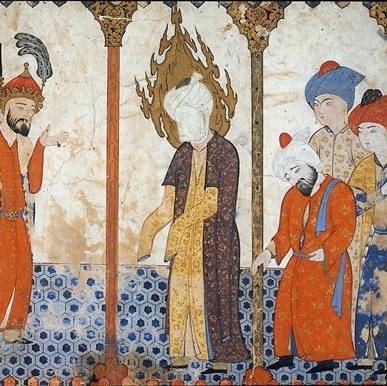
Considering how I am writing this post 8 hours before our oral midterm, I thought it might be interesting to investigate the power of public speech in both a historical and contemporary sense.
First, let’s address the Greeks, since they are allegedly the masters of rhetoric. I was reading an article about the art of persuasion in Ancient Greece, and I became interested in one of the points made by an obscure philosopher that I’ve never heard of named Gorgias (sorry Professor Burton if you know who he is). Anyways, he gave an interesting argument in his Encomium of Helen that having command over the rhetoric word gave one considerable power and influence over others:
“The effect of speech upon the condition of the soul is comparable to the power of drugs over the nature of bodies".
He likens this philosophy to Helen of Troy and argued that one of the reasons she was carried off so easily was because of the power of speech, specifically an appeal to pathos.
So that got me thinking about th e power and devices of different political leaders throughout history and how they were able to effectively unite their respective followers. In my own civilization that I was assigned, I learned about the Islam prophet Muhammad. I mentioned in one of my earlier posts that he was an illiterate merchant who knew nothing of rhetoric or education, yet he became one of the most influential leaders of all time. He united an entire empire that eventually grew to become the Ottoman Empire.
e power and devices of different political leaders throughout history and how they were able to effectively unite their respective followers. In my own civilization that I was assigned, I learned about the Islam prophet Muhammad. I mentioned in one of my earlier posts that he was an illiterate merchant who knew nothing of rhetoric or education, yet he became one of the most influential leaders of all time. He united an entire empire that eventually grew to become the Ottoman Empire.
 e power and devices of different political leaders throughout history and how they were able to effectively unite their respective followers. In my own civilization that I was assigned, I learned about the Islam prophet Muhammad. I mentioned in one of my earlier posts that he was an illiterate merchant who knew nothing of rhetoric or education, yet he became one of the most influential leaders of all time. He united an entire empire that eventually grew to become the Ottoman Empire.
e power and devices of different political leaders throughout history and how they were able to effectively unite their respective followers. In my own civilization that I was assigned, I learned about the Islam prophet Muhammad. I mentioned in one of my earlier posts that he was an illiterate merchant who knew nothing of rhetoric or education, yet he became one of the most influential leaders of all time. He united an entire empire that eventually grew to become the Ottoman Empire. It seems that the effectiveness of speakers is measure by the level of change that is wrought upon the hearts of his/her listeners.
I also reflect on the power of King Benjamin’s speech in this sense. In Mosiah, we learn that King Ben gave such an effective speech (enhanced by the Holy Spirit of course) that he brought the whole multitude to their knees to cry with one voice for forgiveness of their sins. The whole multitude! Not part, but the whole multitude was moved and effectively “there was not one soul…who had taken upon them the name of Christ.” Even if you aren’t religious you can appreciate the power behind one man’s ability to orate to an audience. 



In a modern example, I recently read a speech that Barrack Obama gave in 2009 in Egypt while addressing to the Muslim world. In the speech, I was amazed at his strategies to appeal to an Islamic community. He must have had extensive knowledge of his audience before choosing his words. Proof of this is when he alludes to Muhammad he says the all-important phrase “peace be unto him”. To an Islam, the phrase is one that is used whenever the Prophet’s name is mentioned. The fact that a Westerner recognized that tradition of using that phrase portrays a heightened respect for another culture, no doubt Muslims were impressed. I guess that’s why Obama won the Nobel Prize, right?
Anyways to wrap up, I’d like to just highlight that the spoken word has a profound effect on those who listen. Not just with public speeches, but in everyday life as well. Imagine if we viewed ever y compliment, every insult, and every joke with the same gravity in which what we say may drastically impress another person for better or for worse.
Book of Mormon: Ref. Mosiah 4:1-3; 5:2
“A New Beginning”, President Barrack Obama; Address at Cairo University, June 4, 2009
(Not sure of exact citation since it was a PDF file)
Andrew, thanks for the link you posted about rhetoric in Ancient Greece! I was especially interested in the idea that rhetoric is a neutral tool. The author points out that the truth or falseness of a speech depends upon the ethics of the speaker. It's interesting that learning these methods of rhetoric, as Muhammad or President Obama has, presents someone with the choice of using them for good or ill, flattering people as Hitler did in Germany after they had been shamed in the first World War, or teaching people to honor the Lord, as Muhammad did. "With great power comes great responsibility."
ReplyDeleteIt seems like a lot of the people we remember the most in recent history were the masters of rhetoric. MLK, JFK, FDR, and even Hitler are some of the most important names of the 20th century, and is it coincidence that all were excellent speech givers and masters of rhetoric?
ReplyDelete